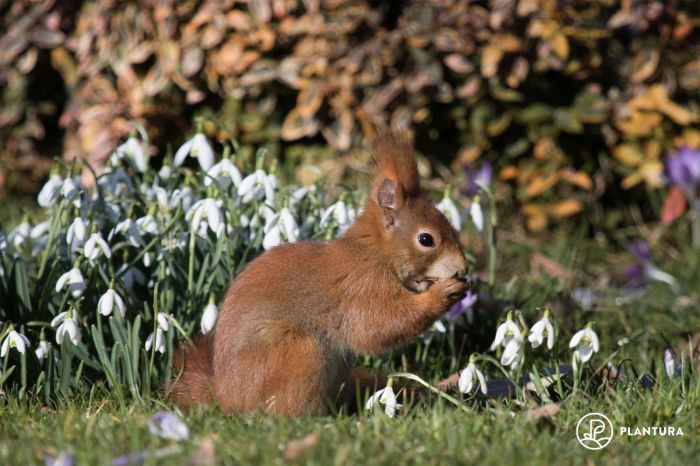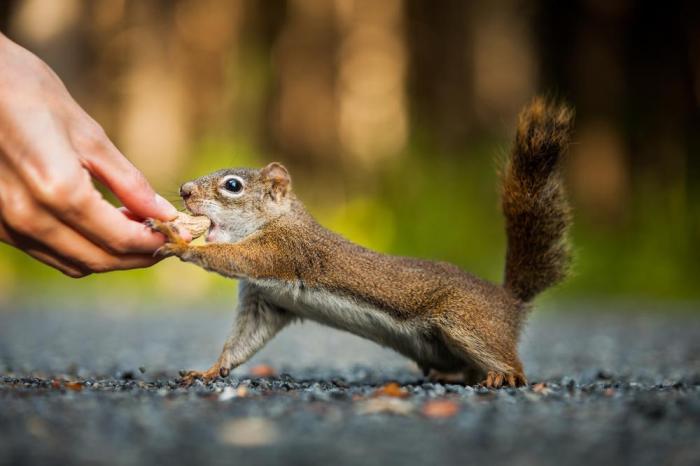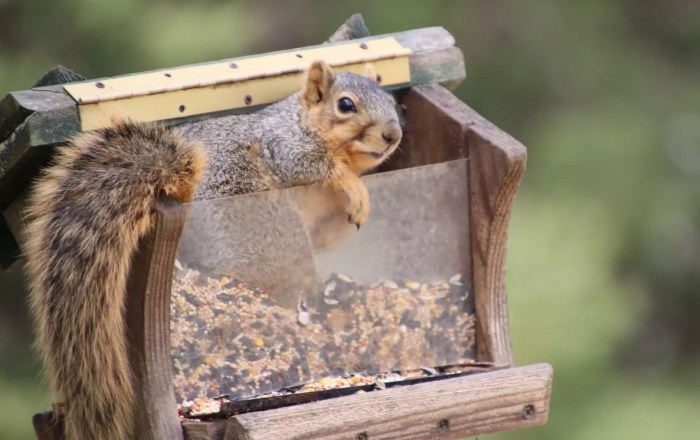How to attract squirrels – Discover the secrets to attracting squirrels to your backyard or garden with our comprehensive guide. From providing their favorite foods to creating a safe and welcoming habitat, we’ll share everything you need to know to become a squirrel whisperer.
Squirrels are fascinating creatures that can bring joy and entertainment to your outdoor space. By understanding their needs and preferences, you can create an environment that will attract them and keep them coming back for more.
Feeding Habits and Preferences

Squirrels are omnivorous and opportunistic feeders, but they have a preference for certain foods. Understanding their dietary needs and preferences is crucial for attracting them to your backyard.
Their diet primarily consists of nuts, seeds, fruits, and vegetables. They also consume insects, bird eggs, and even small vertebrates like mice. Squirrels are also known to raid bird feeders, so it’s important to keep your birdseed out of their reach.
If you’re looking to attract squirrels to your backyard, one of the best things you can do is provide them with a food source. Squirrels love nuts, seeds, and fruits, so setting out a bird feeder filled with these treats is a great way to entice them.
You can also plant trees and shrubs that produce nuts and fruits, such as oak trees, hickory trees, and apple trees. If you have a bat problem in your attic, you may want to consider how to get rid of bats attic before you start attracting squirrels.
Squirrels can carry diseases, so it’s important to make sure your home is free of bats before you invite other animals in.
Nuts and Seeds
- Acorns
- Walnuts
- Pecans
- Almonds
- Hazelnuts
- Sunflower seeds
- Pumpkin seeds
Nuts and seeds are high in fat and protein, which are essential for squirrels’ energy and survival. Acorns are a particularly important food source for squirrels, especially during the winter months when other food sources are scarce.
Fruits and Vegetables
- Apples
- Bananas
- Berries
- Grapes
- Corn
- Peas
- Carrots
Fruits and vegetables provide squirrels with vitamins, minerals, and antioxidants. Apples are a favorite among squirrels, and they will often raid apple trees in the fall.
Fresh Water
In addition to food, squirrels also need access to fresh water. Providing a shallow dish of water in your backyard will encourage squirrels to visit and stay for longer periods.
Foods to Avoid
There are certain foods that can be harmful to squirrels and should be avoided. These include:
- Chocolate
- Candy
- Salty snacks
- Avocado
- Rhubarb
These foods can cause digestive problems, weight gain, and even death in squirrels.
Landscaping and Environment: How To Attract Squirrels

Creating a squirrel-friendly yard or garden can be a rewarding experience, providing you with hours of enjoyment watching these active and entertaining creatures. By incorporating native trees and shrubs that offer food and shelter, and avoiding the use of harmful pesticides and herbicides, you can create a thriving habitat for squirrels.
Attracting squirrels to your backyard can be a fun and rewarding experience. They’re curious and playful creatures that can provide hours of entertainment. But what attracts squirrels to a house? Food is a major factor, of course. Squirrels are omnivorous and will eat a variety of foods, including nuts, seeds, fruits, and insects.
They’re also attracted to water, so providing a birdbath or other water source can be a good way to attract them. Another thing that attracts squirrels is shelter. They need a place to sleep and raise their young, so providing them with a nest box or other shelter can be a good way to encourage them to stick around.
And finally, squirrels are social creatures, so they’re more likely to be attracted to a house where they see other squirrels. If you’re having trouble attracting squirrels to your house, you may want to try adding some of these features.
You may also want to consider checking out our article on what attracts spiders to a house to make sure you’re not doing anything that’s deterring them.
Native Trees and Shrubs
- Plant a variety of native trees and shrubs that produce nuts, fruits, and seeds, such as oak, hickory, maple, dogwood, and elderberry.
- Choose species that provide food throughout the year, including early-blooming trees like willows and maples, and late-fruiting shrubs like viburnum and winterberry.
- Create a layered landscape with trees, shrubs, and groundcovers to provide shelter and nesting sites.
Avoid Pesticides and Herbicides
Pesticides and herbicides can be harmful to squirrels, both directly and indirectly. Direct exposure can cause poisoning, while indirect exposure through contaminated food or water can lead to health problems.
- Use natural pest control methods, such as beneficial insects, traps, and barriers.
- Choose herbicides that are specifically labeled for use around wildlife.
- Apply pesticides and herbicides only when necessary, and follow the instructions carefully.
Safety and Precautions

While attracting squirrels can be a rewarding experience, it’s crucial to prioritize their safety and well-being. Squirrels face various hazards in urban and suburban environments, and it’s our responsibility to minimize risks and protect these fascinating creatures.
Here are some key safety precautions to consider when attracting squirrels:
Potential Hazards
- Predators:Cats, dogs, hawks, and owls pose significant threats to squirrels. Ensure your property is free from potential predators or provide safe hiding spots for squirrels to escape.
- Traffic:Busy roads and driveways can be dangerous for squirrels. Place feeders and water sources away from high-traffic areas and provide escape routes for squirrels to avoid collisions.
- Power Lines:Squirrels are prone to electrical accidents when they come into contact with power lines. Trim tree branches near power lines and avoid placing feeders near electrical wires.
Minimizing Risks, How to attract squirrels
- Use Squirrel-Proof Feeders:Invest in squirrel-proof feeders that prevent larger animals from accessing the food, reducing the risk of attacks.
- Provide Escape Routes:Create escape routes for squirrels to flee predators, such as tall trees or dense shrubs.
- Keep Pets Indoors:Supervise pets when they are outside to prevent them from chasing or harming squirrels.
Respecting Wildlife
Remember that squirrels are wild animals and should be treated with respect. Avoid direct contact with squirrels, as they can carry diseases and bite if threatened. Observe them from a distance and provide a safe environment for them to thrive.
Wrap-Up

With a little effort and attention to detail, you can create a squirrel-friendly paradise that will provide hours of enjoyment for you and your furry visitors. Remember to respect wildlife and avoid direct contact, and you’ll be rewarded with the delightful presence of these charming creatures.